- Home
- Mitch Albom
The Next Person You Meet in Heaven Page 2
The Next Person You Meet in Heaven Read online
Page 2
“For good luck,” Paulo said.
“Right,” Annie said, although she was tempted to add she thought their marriage was already good luck.
Paulo pushed the door open. Rain drummed the pavement. “Hey, buddy!” Paulo hollered. “Trouble?”
The man nodded as Paulo approached. “My wife’s car,” he yelled. “The tire’s flat. And of course she doesn’t have a jack in the trunk. Do you have one?”
“A wife?”
“A jack.”
“I’m kidding.”
“Oh.”
Rain ran down both their faces.
“I bet the limo has one.”
“That’d be great.”
“Gimme a second.”
Paulo darted to the trunk of the limousine, smiling at Annie and making exaggerated arm motions, like a movie actor running in slow motion. The driver hit a button, the trunk opened, Paulo found the jack, and ran back to the stranded motorist.
“Thanks a lot,” the man said. “Wives, you know?”
“Well, I’m not an expert,” Paulo said.
* * *
Eight hours left. Annie watched through the rear window as Paulo and Tolbert wiped their palms on a rag. The tire had been changed. They chatted in the rain.
Annie fingered her wedding ring. She saw the men laugh. Paulo, standing closest to the highway, turned towards Annie and raised the stranger’s wrist, as if signaling they were champions. For a moment, she felt amazed at her good fortune: a new husband in a wet tuxedo, so handsome he nearly glowed.
And then she realized the glow was from headlights. A car was coming up fast behind Paulo, illuminating his silhouette. Annie felt a rush of panic. She yelled his name. But Tolbert grabbed Paulo’s arm and yanked him aside.
The car zoomed past.
Annie slumped in her seat.
* * *
“Hey, look at this,” Paulo said, sliding in all wet beside her and holding up a business card. “The guy runs hot air balloons—”
Annie grabbed him. “Oh, my God!” she gushed, between kissing his wet cheeks and his wet hair and forehead. “I thought that car was going to hit you.”
“Yeah, he was going fast. Good thing that guy—” Paulo saw her relief and took her face in his hands. “Hey. Annie. Hey.” He squinted as if peering deep inside her. “I’m fine. No big deal. Nothing’s gonna happen to me. We just got married.”
Tears filled Annie’s eyes.
“Let’s get to the hotel,” she whispered.
“To the hotel!” Paulo announced.
The driver pulled away.
* * *
Do you know what causes wind? High pressure meeting low pressure. Warm meeting cold. Change. Change causes wind. And the bigger the change, the stronger the wind blows.
Life is much the same. One change blows in another. After the flat tire, the balloonist named Tolbert, concerned about driving on a spare, changed his plans and went home instead of to work, as he normally did this early on weekends. He called his assistant pilot and said, “Handle things until noon, OK?”
That assistant, a bearded young man named Teddy, changed his plans as he groggily replied, “No problem.” He made coffee and got dressed.
Annie and Paulo, having shed their wedding clothes and shared a bed for the first time as a married couple, changed their plans as the sun began its rise through their hotel curtains. Annie stroked Paulo’s hair as Paulo pushed into the pillow.
“Oh, man, I am beat!”
But Annie did not want things to end.
“If we don’t go to sleep, technically it’s still our wedding night, right?”
“I guess.”
“In that case . . .”
She leaned over him and swiped a business card off the nightstand.
“A balloon ride!” Annie said.
“Noooo—”
“Yessss—”
“No-no-no—”
“Yes-yes-yes—”
“Annie—so impetuous!”
“I know. It’s not like me. But I saw a balloon as we were saying our vows. Maybe it was a sign. The card says ‘sunrise trips.’”
“Yeah, but—”
“Pleeeease . . .”
“Ohh . . . kay.” Paulo squeezed his eyes shut, then popped them open. “Yes!”
Annie grabbed the phone. Her last call before dying began with, “Hi, are you flying today?”
* * *
Five hours left. Wearing light jackets against the morning chill, Annie and Paulo held hands near a large passenger basket in the middle of a grassy field. It all seemed so serendipitous: a business card, a phone call, a pilot named Teddy, a launching spot not far from their hotel. What a wonderful future story to tell, Annie thought. A wedding night that ended in the clouds.
A small crew ran propane burners to heat the air inside the balloon. Within minutes, it began to rise, like a yawning giant waking from its sleep. As the envelope filled to a massive pear-like form, Annie and Paulo leaned easily into each other, marveling at this silent airship that would lift them to the skies.
At that moment, they could not have known certain things: that Teddy was only a novice pilot, eager to prove himself; that he had agreed to take them up, despite a less-than-perfect weather report, because they were newlyweds; that newlyweds were a lucrative type of customer in the balloon world; that Teddy figured if these newlyweds told other newlyweds, it could be good for business.
And good for business was good for him.
“Ready to depart?” Teddy said.
He ushered Annie and Paulo into the basket. He shut the door behind them and, with the cables detached, let loose a stream of fire from the burner.
The balloon lifted from the ground.
* * *
“Oh, my God,” Annie marveled forty minutes later, as they glided over vast, empty pastures. “This is unbelievable.”
Paulo gripped the basket railing. “Why do people say ‘unbelievable’ about something that just happened? Wouldn’t that make it believable?”
Annie grinned. “OK, genius.”
“I’m just saying—”
A sudden gust hit the balloon, veering it sharply westward.
“Whoa,” said Teddy.
“Whoa?” said Paulo.
“It’s nothing,” Teddy answered, eyeing the clouds. “Winds are kicking up. I’m gonna take it down a bit.”
He pulled a valve, cutting the hot air, causing them to descend. A few minutes later, with the skies darkening, another strong gust pushed them farther west. Annie noticed they were getting closer to a thicket of trees.
“Can a person technically steer a balloon?” Paulo asked. “I’m not being critical or anything—”
“Just up and down,” Teddy said, his hand on the propane burner. “We’re fine. Don’t worry.”
They continued drifting in a westward direction. The winds increased. The clouds thickened. Teddy opened a hatch, allowing hot air to escape and the balloon to go even lower, hoping to avoid the gusts. A more experienced pilot would know that doing this could increase the risk of collision with the treetops, and staying high might be the safer, if rockier, course of action. But the more experienced pilot was Tolbert, who, at that moment, was at an auto repair shop, getting a new tire.
Suddenly the trees were very close. “It’s all right, no biggie,” Teddy said, “but you might want to get down, in case we scrape a branch.”
Then, as the woods drew closer, his voice intensified. “OK, get down!”
Annie and Paulo dropped inside the basket. The bottom half of the balloon smacked into high branches and the passengers were jolted to the side.
“Stay down!” Teddy yelled again. “I’m gonna land us!” He pulled the hatch even more, which caused a loud hissing sound. Looking up from her crouch, Annie glimpsed something dark and horizontal through the thick display of leaves.
Power lines.
The balloon made contact and pushed one line into another. Annie heard a sizzle. She saw a blinding flash.
Sparks exploded and Teddy’s knees buckled. He hollered, “Jesus!” and the basket dropped rapidly. Annie yelled and Paulo yelled and then everything was flipping and Annie couldn’t get a straight view, trees, sky, floor, an arm, a rope, sky, shoes, fire.
They blew sideways and the basket smacked the earth, tossing the three passengers across its bottom. Annie saw flames, sky, ropes, Paulo, her elbow, blue jeans, sky, then Teddy disappeared over the side rail and the balloon began to lift again, hot air from the propane fire causing it to rise.
Suddenly, she felt Paulo’s arms hard around her ribs. “Jump, Annie!” he yelled. She saw his face for an instant, but before she could say his name, he threw her from the basket and she was falling in the air, falling and then—bang!—she hit the ground, back first.
Her vision turned to stars, a million tiny lights blocking out the sun. When she finally refocused, she watched in horror as the balloon exploded in flames, and a figure dropped towards her, growing larger as it descended, arms flailing wildly.
Then Paulo, her new husband, thudded to earth.
Annie screamed.
* * *
In the dizzying hour that followed, one sentence clung to her like an anchor: This is my fault. Through the ambulance, the sirens, the gurney, the medics, the hospital, the emergency room, the doors that flew apart with a slam of a metal panel, that sentence would not let her go. This is my fault. Through the scrambling bodies and the beeping machines and her Uncle Dennis, in surgery scrubs, hugging her tightly as Annie’s tears left a wet spot on the pale green fabric.
This is my fault.
I made us go.
I did this.
I ruined everything.
The fall had left Annie bruised and sore, but Paulo, who dropped from forty-one feet in the air, had smashed bones, severed tendons, and damaged several vital organs. His legs, pelvis, jaw, and right shoulder were all fractured from the blunt force, but his lungs had suffered the most damage; they were lacerated and bleeding from the crushing of his chest wall. A breathing tube was inserted to keep him going, but the images showed that neither lung could be sustained. He would need a new one to live. The doctors whispered about national registries and transplant lists and who could be called on such short notice. Which was when Annie, her mouth agape throughout the conversation, abruptly spoke up.
“Take mine.”
“What?”
“My lung. You have to take it.”
“Annie, it’s not an option—”
“Yes, it is. It can save him!”
A debate quickly followed, as her uncle and others tried to convince Annie this was wrong. But she was screaming and resolute, and as a nurse she was versed in the minimum requirements for transplants, like blood type (which Annie and Paulo shared) and relative body sizes (they were the same height). She kept looking at Paulo through the doors of an operating room, surrounded by nurses and machinery. Paulo, who had saved her. Paulo, who was dying because of her.
“Annie, there’s a risk—”
“I don’t care—”
“Things can go wrong.”
“I don’t care!”
“He’s in bad shape. Even if we succeed, he may not . . .”
“What?”
“Live.”
Annie swallowed. “If he doesn’t, I don’t want to.”
“Don’t say that—”
“I mean it! Please, Uncle Dennis!”
She had been crying so much, she didn’t think there were any tears left. But she remembered how happy she and Paulo had been two hours ago. Two hours? How can life change this much in two hours? She repeated what Paulo had said in the back of the limousine, the words he had used to reassure her.
“We just got married . . .”
Her whole frame shook, and Dennis exhaled as if punched in the stomach. He turned to the senior surgeon, whose mouth was covered in an eggshell mask. He said a name they both knew, the top transplant expert at the hospital.
“I’ll make the call,” the senior surgeon said.
* * *
The rest of the details flew past like blowing rain. The rolling monitors, the wheels of the gurney, the alcohol wipes, the needles, the tubes. Annie ignored all of it, as if these were things happening to a shell around her. In the middle of a big crisis, a small belief can be your salvation. This was Annie’s: she believed she could save her husband. She could make up for her mistake. One lung each. We share. She focused on that, as intensely as a trapped miner focuses on a beam of light.
Lying on the operating table, Annie said a prayer. Let him live, God. Please let him live. She felt the anesthesia taking over, her body going limp, her eyes closing. Her last conscious memory was of two hands on her shoulders, nudging her gently down, and a man’s voice saying, “See you in a little bit.”
Then the world was spinning and darkening, as if Annie were being lowered into a cave. Out of the blackness, she saw something strange. She saw the old man from her wedding running towards her, his arms outstretched.
Then everything went white.
Annie Makes a Mistake
She is two years old. She sits in a high chair. A green sippy cup is in front of her, filled with apple juice.
“Jerry, watch,” her mother says as she removes the top. “She can drink from a straw.”
“Wowee,” her father mumbles.
“Kids her age can’t do that.”
“I’m busy, Lorraine.”
“You’re reading a newspaper.”
“That’s right.”
Annie bounces.
“She wants your attention.”
“I’ve seen her drink.”
“She can use a straw.”
“I heard you the first time.”
“Please, Jerry? It’ll only take a—”
“That’s it. I gotta go.” He slaps down his newspaper. Annie hears the big noise he makes pushing his chair from the table.
“Well,” her mother says, unwrapping the straw, “let’s practice so we can show him next time, OK?”
She touches Annie’s soft cheek, and Annie, happy with the attention, swings her hand and knocks over the juice. It spills everywhere. She starts to cry.
“What’d you do to her?” Jerry yells from the hallway.
“Nothing!”
“Don’t sound like nothing.”
Her mother grabs a paper towel and wipes up the juice.
“It’s all right, sweetie,” she whispers to Annie. “Just an accident.”
She kisses Annie on the cheek. As the front door slams, she looks down. “Just an accident,” she repeats. “All gone now.”
The Journey
Normally, when we come out of sleep, we open our eyes and everything resets. The dream world vanishes; the real world takes its place.
But this was not sleep, and what happened next to Annie was unlike any of her previous awakenings. Her eyes never opened, yet she could see quite clearly.
And she was moving.
The ground beneath her feet seemed to carve loose and zoom at tremendous speed, but with no friction, like a glass-enclosed elevator catapulted into space. She sped through colors of every shade, lavender and lemon and avocado green.
She felt no wind, but she heard wind. It seemed to come towards her in a rising squall, then pull away as if sucked through a tunnel, like a massive inhale and exhale. Oddly, this did not concern her. In fact, Annie felt no worry at all. She felt almost airy, and as pain-free as a child.
Then something shot through her, something so alien she would not have had the words for it. Every piece of her was ill-fitting, as if her arms and legs had lengthened, and her head was on a new neck, and images flashed through her mind that had never been there before: the inside of a home, faces in a classroom, glimpses of the Italian countryside.
Then, just as quickly, she was back in her own consciousness and the colors were shooting by again, turquoise and yellow and salmon and wine red. She tried to find her way back to an idea, something ab
out Paulo—Paulo is hurt? Paulo needs me?—but it felt as if she were swimming upstream against her memories. A balloon. A fire. A crash. A hospital.
“It could be good luck.”
Is Paulo alive?
“We just got married.”
Did I save him?
“See you in a little bit . . .”
Where am I?
Annie Makes a Mistake
She is four years old. She sits at the dinner table. Her parents are fighting. She plays with her fork.
“I can’t believe you,” her mother says.
“It just happened,” her father says.
“Can I have a Creamsicle?” Annie asks.
“Go play, Annie,” her mother mumbles.
“Go play,” her father echoes.
“But can I have a Creamsicle?”
“Annie!”
Her mother rubs her forehead.
“What are we supposed to do?”
“We don’t have to do nothing.”
“Like the last time? Or the other times?”
“Daddy—?”
“Jesus, Annie!” her father yells. “Shut up!”
Annie’s face drops. Her mother pushes from the table and hurries down the hall.
“Oh, yeah, great, run away,” her father says, following after her. “What do you want from me? Huh?”
“I want you to remember you’re married!” she yells.
Annie, now alone, slides from her chair. She tiptoes to the freezer. She pulls on the handle. With a thwock, the door opens.
The air is cold. But there it is: the box of Creamsicles. She wants one. She knows she’s not supposed to. She sees two frozen Hershey’s bars on the lower shelf. Her parents like those. She grabs one to bring to them. Maybe they will stop fighting. Maybe they will let her have a Creamsicle.
She steps back to watch the freezer door close—and is jerked up violently by two large hands.
“You stupid brat!” her father yells, as the Hershey’s bar drops. “I told you not to do that!”
Annie feels a slap across her face and her eyes shut and the world goes black. Another slap. Tears ooze. Another. She cries so loudly her ears hurt.
“Stop it, Jerry!” her mother hollers.
“When I say no, I mean no!”
“Stop it!”

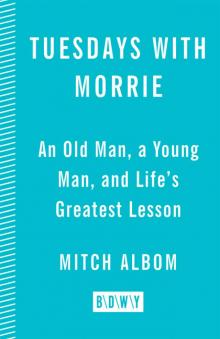 Tuesdays With Morrie
Tuesdays With Morrie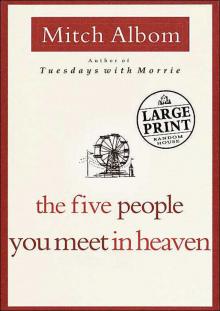 The Five People You Meet in Heaven
The Five People You Meet in Heaven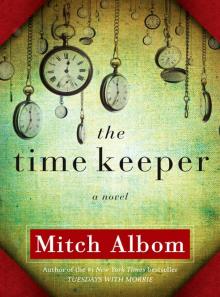 The Time Keeper
The Time Keeper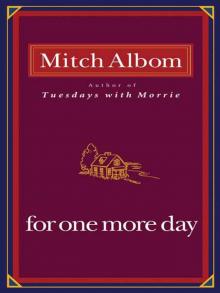 For One More Day
For One More Day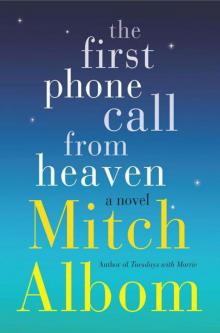 The First Phone Call From Heaven: A Novel
The First Phone Call From Heaven: A Novel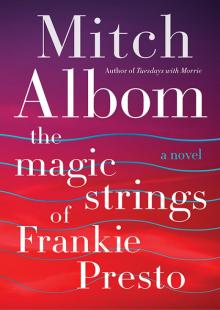 The Magic Strings of Frankie Presto
The Magic Strings of Frankie Presto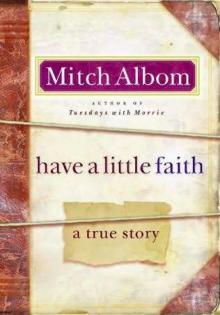 Have a Little Faith: A True Story
Have a Little Faith: A True Story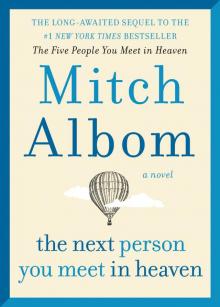 The Next Person You Meet in Heaven
The Next Person You Meet in Heaven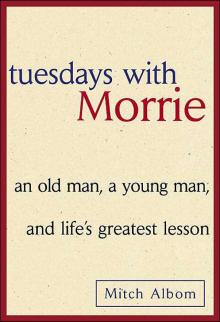 Tuesdays with Morrie: an old man, a young man, and life’s greatest lesson
Tuesdays with Morrie: an old man, a young man, and life’s greatest lesson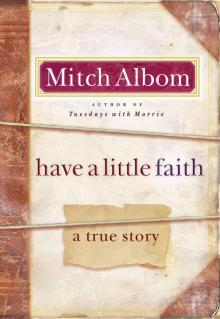 Have a Little Faith
Have a Little Faith